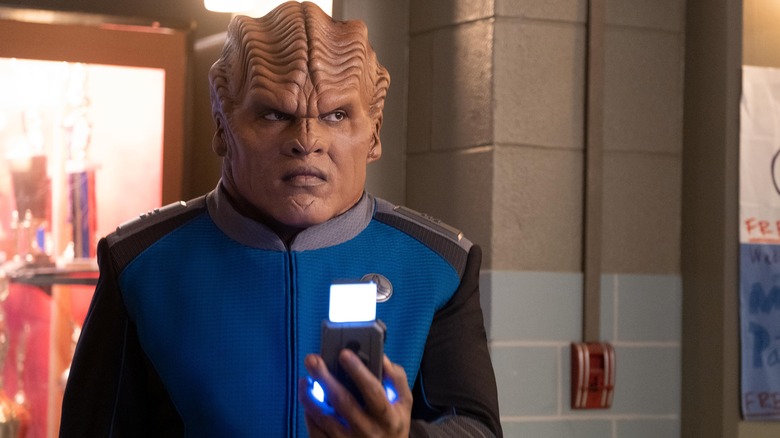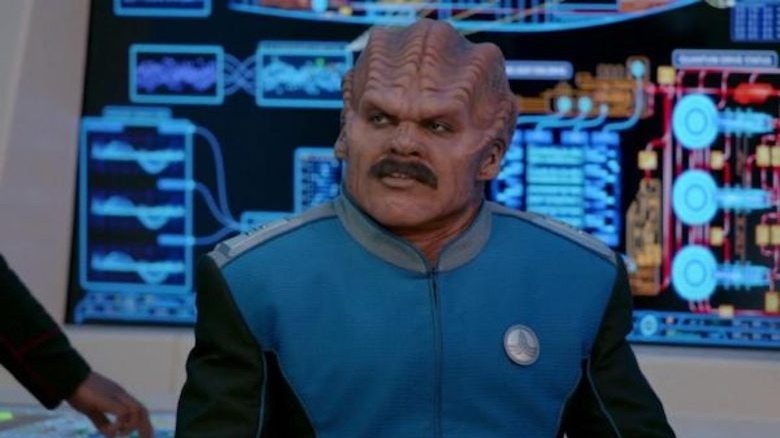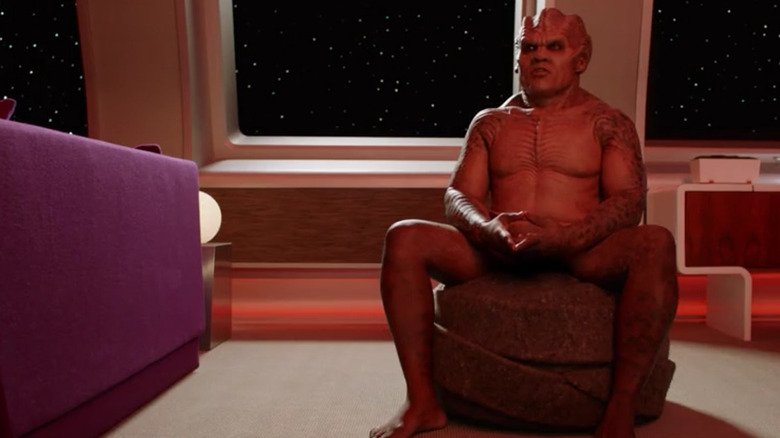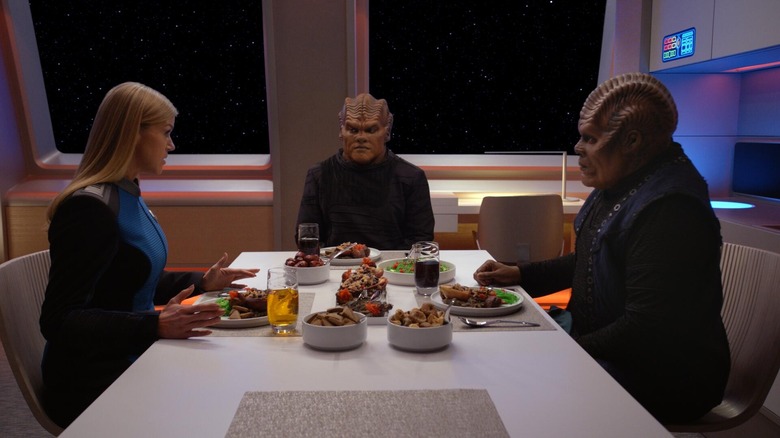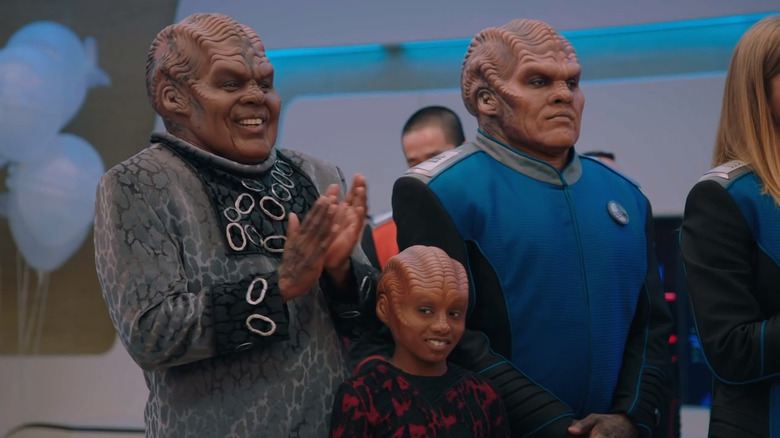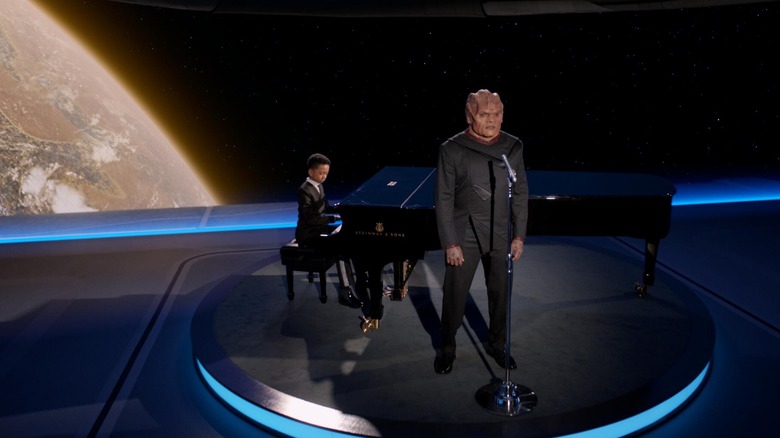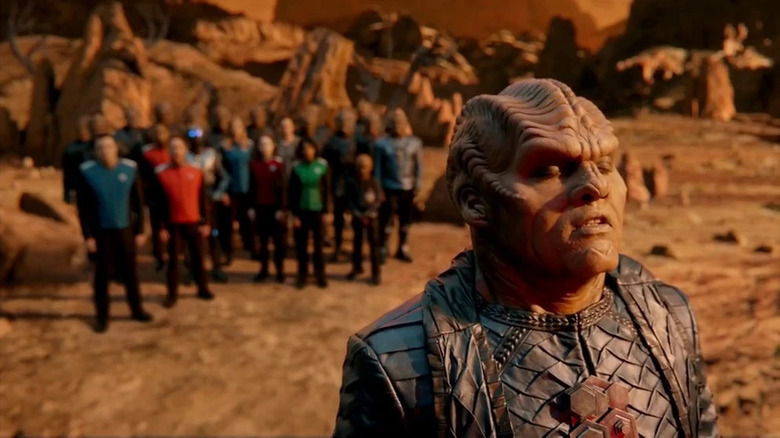The Orville: New Horizons Actor Peter Macon On Finding Comedy Under Prosthetics [Interview]
Some of the best and most effective science fiction holds a mirror up to society and offers a good look at how things could be better. No matter how bleak or divisive a scenario might be, the genre can offer hope in what can often be classified as a hopeless situation. This is something that "The Orville" has done time and time again in its three season run so far, and one character that has been at the center of some of the best episodes that exemplify that idea is Peter Macon's Lt. Commander Bortus.
Whenever an episode spotlights the Moclan officer, his family, or his culture, the audience is almost certainly in for a curious, thought-provoking, and sometimes even fun ride. After the episode titled "A Tale of Two Topas" premiered, we had a chance to speak with Macon about his character on "The Orville: New Horizons." As we discussed the literal trials and tribulations of Bortus' family, we also explored all the opportunities for comedy in this role and how fulfilling it has been for him to sink his teeth into such a meaty role as an actor. Plus, we touch on how the episode hits much differently after the overturning of Roe v Wade, and the future of Bortus, Klyden, and Topa.
This interview has been edited for clarity and brevity.
'Seth would say that's putting a hat on a hat'
First question: Do you also miss Bortus' moustache?
[Laughs and gestures to his facial hair] Can't you tell? Yeah, that was a lot of fun. I mean, I don't know if Bortus misses the mustache, but I felt like it made him very distinguished. I kind of wish that they would let him keep it, but Seth [MacFarlane] would say that's putting a hat on a hat.
In all seriousness, for such a serious guy, Bortus has been involved in a lot of really fun moments, like participating in a shootout set to Dolly Parton. Do you have a favorite fun moment for Bortus on the show?
It's a funny thing you should ask that. Someone in my family, they've moved out to the suburbs. They're not science fiction people at all. They watched the episode where Gordon is like, "I'm going to do a double helix," or whatever it was called. He's spinning the ship around and there's this one little moment where Bortus is about to throw up. That was a tricky thing to get, but it's like those little tiny things like that. Tom Constantino [is our] editor. [Stuff like] that has a lot to do with him just finding the correct beat, you know what I mean? We shot it a bunch of different ways. Some of it was over the top and some of it was too little, but just trying to find that little space where all this crazy stuff is going on and you have this one cut where Bortus is like [imitates puke face]. I mean, that makes for the funny. So I love all that stuff.
There was another [example in] the smoking episode last season where, the camera is closing in on him from behind and he's in the captain's chair. Then you just see this chair and his head and the smoke billowing out from the chair. That sh*t's funny to me.
These little tiny things — seeing Bortus in a cowboy get-up or in a sort of 17th century dueling outfit. It's that kind of stuff where it's like, "What am I looking at?" I [like] being able to deal with physical comedy. I studied clown in grad school for two years, and that was like the most humiliating and rewarding class I've ever taken and experienced. Also, being able to work all the physical stuff in as well with the limitations with the prosthetics. His head is extremely large. I have very limited mobility with my neck because his trapezoids are just off the chain, right? But just working within those parameters to make the funny is some of my favorite stuff to do in the prosthetics. All that small stuff is challenging, but it's the stuff that I found to be the most fun when they came down to the comedic stuff and like delivering lines like, "Now entering glory hole." You know what I mean? It's just like, how do you do it with a straight face?
[It's] because English is not his first language. He's not human. And so these are all the things that I have to attribute to him being an alien. That's why it's funny, because he doesn't really, really know what he's saying. It's like telling your three-year-old to swear or something like that. This sort of tight rope that I get to walk with the humor and the drama of his personhood, if that makes sense, is big fun.
'Growing up, I really identified heavily with Eeyore'
While many confuse stoicism and logic for a lack of emotion, Lieutenant Commander Bortus often shows us that those things aren't mutually exclusive. How challenging was it for you to craft Bortus' signature Moclan disposition while still conveying an array of emotions in the course of the show?
When I was building his identity cerebrally, I sort of said if Sam the Eagle from the Muppets and Eeyore from Winnie the Pooh had a love child, it would be Bortus. Growing up, I really identified heavily with Eeyore because of my voice. I had this crazy voice when I was young and he's sort of like an emotional dude. I identified a lot with Eeyore, more than Tigger or Pooh. Then watching the Muppets, I'm like Sam the Eagle. Animal was my favorite, but with Sam the Eagle, I just remember it was stoicism, but he was also kind of silly. His hubris undid him a lot because he was just so proud, but he just kind of missed subtle things. I just felt like that's a great model.
Then with the prosthetics, that helped me to build his physicality. I always made it a point [of] stacking my spine upright, sitting upright, and [being] very formal. He never says, "Won't," he'll say, "Will not." He doesn't say, "Can't," he says "Cannot." It's very formal. So I took that writing and applied that to his physicality, which is very measured, because that's what it means to be an officer.
And then, he is complicated, right? He's a complicated soul because he's sort of a misfit Moclan, you know what I mean? He's not a traditionalist like Klyden is, so that separates him and alienates him a bit from his own people in a way. And that's all working. He says in season 2 where he develops the porn addiction, "I went inside as opposed to dealing with my life." I'm paraphrasing, [but it wasn't] the smartest solution considering everyone almost died, but you could feel [how Bortus was] kind of trapped, in a way, of not knowing what to do. I escaped into this place and that was how I dealt with the reality of not loving my partner or falling out of love with my partner, or hating my partner, or having this huge obstacle between us, which is our child. And so, on the surface it was like this stoic face. But on the inside he's crying out for help. So there's all of that operating.
"Duality" is a word that I feel can sum up his existence. The duality of being an officer in a science vessel or a spaceship essentially getting in space battles, and then having your family on board at the same time. The duality of being a misfit Moclan and being partnered with a traditionalist Moclan. This makes for a lot of conflict and I feel like he is always trying to sort out conflict inside. But because of our physical makeup, you can't really see that because it's not a pliable, very expressive face. A lot of that has to be done conveying these things in my mind and with my eyes and that presents a great challenge to try to walk that line of that duality.
Then with the humor, to him being unaware ... it's funny to be like, "I'm going to eat this glass. You know, I could eat anything," and not comment on it. That's what makes it funny. I remember when I auditioned for the part, I had an idea of commenting when he has this conversation with [Seth MacFarlane's character Ed Mercer]. The scene was Bortus and Ed and talking about the egg and he was like, "I need 21 days off for paternity leave. I have to lay this egg." [Ed asks], "You lay eggs? Are they large eggs?" And the line is, "They are quite large, yes." In my audition, I wanted to try to put some funny in it by commenting on how large the eggs are because everybody thinks it's coming out of his butt, of course. That's not how it works, but I won't tell you that. But Seth was like, "No, it's funnier if you just lay it out flatly, straight, factually. If you swallow up the funny, then we don't get the funny." From the beginning, I've always had to walk that line of, like I said with "Now entering glory hole." It's way funnier if I say that just flat out factually ... and just not comment on it. Because then you guys, the audience, gets to [react]. So it's technical as well. That's all extremely enjoyable for an actor like myself. I just love the tragedy and I love the funny, you know?
'This is heavy, man'
You've talked a lot about duality and that's a huge theme of the season 3 episode "A Tale of Two Topas." How did you feel about the script when you first read it? Were you surprised by where it left Bortus, Klyden, and Topa by the end?
I won't say surprised. I loved it because it was a deeper dig from [season 1 episode] "About A Girl." It just continued to mine what that relationship of those three microcosmically are [and] macrocosmically with all the Moclans, which is still being unearthed. I was like, "Okay, what's going to happen?" I can't think of the word, but like I felt like an audience. And it wasn't until I read, I think it's episode 7 or 8 that's coming, which bookends or fleshes that out further.
So when I read "A Tale of Two Topas," at first I was like, "What? Okay, so now I have to sing? Are you joking?" But he's not a terrible singer, let's put it like that. But then [it's] just getting deeper and deeper and deeper [with] the relationships with these Moclans and how they're juxtaposed with humanity. I was very excited and proud that our storylines — the coexistence of human beings or just the coexistence of species sort of rests on our shoulders in the sense of the way that we unpack what that is, on a moral basis. Did we ask these questions? Like, well, is the planetary union, which seems to be sort of human centrist in terms of its morality barometer ... we continue to explore the conflict of what this is. And it's conflict on a major scale, but a macro scale. And it's conflict on a micro scale just between the family and [also] what this does to the union. It's operating on all these, again, dualities. And that's just great writing when you have conflict that's operating on both scales.
I was very excited to shoot it once we read it. And then to watch it, I was like, "Oh, wow, yeah. This is heavy, man." I really had, I won't say a great time shooting it, because it was heavy, emotional stuff ... it just felt like a great pocket to fit in dramatic scene work. And it was just so great to work with Chad and Imani because they're just so solid, solid actors. Nothing was manufactured. It was a great time. It felt like it was on a stage. I grew up doing theater for 30-plus years and it just felt like that. It felt very familiar and very familial. Some really deep — not arguments, but conflict with family, and that's heavy stuff.
Coexistence
Does the episode hit differently now for you after the current events here in America, particularly regarding healthcare for women?
Oh yeah, absolutely. Yeah, man. I am just thoroughly, thoroughly disgusted right now....
I just don't understand. Mother's Day, right? Nothing that we have, nothing — this conversation, this computer, nothing, other than the natural elements of trees and wind and fire, would exist without women. I don't understand the agenda of not teaching critical race theory. Because [why wouldn't you?] There were a lot of non-African people who were abolitionists and there are a lot of white people in this country, the experiment of America, who were abolitionists. Why wouldn't we want to teach about them? Why is everything so black and white?
Anyway, you get my gist. But I'm just disgusted. Disgusted, and I don't understand the agenda. But I don't want to just be disgusted. I don't want to just be mad. I still believe that this place ... I mean, I don't know if I still believe it, honestly. But I want to believe that the experiment can still go forward. This place is about difference, and collective difference, and getting along, and coexistence, and all of this. I want to believe that. I don't know that I do right now.
But with the show, what's great is that we're [addressing all of that]. I think "About A Girl," season 1 episode 3, it aired right when "Bathroomgate" was going on, when they were trying to decide who can use what bathroom and like the ridiculousness of all of that. To have this show about gender reassignment be a mirror reflecting back on the culture, it's nice to have these shows that are dealing with these issues that are synonymous, in a way, with what's happening in our world right now.
It feels significant. It feels like it's relatable. It is not removed science fiction that's so far ahead in the future that it's not relatable. I guess it is more than human nature, but like carbon-based, organic, whatever — species getting along. Coexistence, period. Just coexistence, what that entails, and what that means, on the bed of real issues. I feel like makes our offering to the zeitgeist that much more relevant and I don't feel like we're doing it in like this weird vacuum. It's not just escapism. It's like we're actually taking on issues that we're grappling with right now, and I love being a part of that.
My grandmother said, "Your only job in the world is to treat people like you want to be treated and leave the world better than you found it. That's all you got to do." It certainly feels good, as an actor and an entertainer, to be doing work that's meaningful. It's not just wild escapism and you can't just walk away apathetic. I feel like I'm doing something that matters. At the end of the day, I think that's what we all want to do, right?
'It was not without cost'
One of the most emotional moments of the episode for me was when Bortus was singing "You'll Never Walk Alone" in front of the whole crew as Isaac reverses Topa's sex change operation. Seth MacFarlane loves a showtune and he always inserts them pretty masterfully. While Bortus clearly has the support of the crew, how do you think he'll do as a single father now that Klyden's out of the picture?
I mean, I think we know the answer to that. My wife and I have two boys and right now she's at work and I'm at home. And there was an incident that I'm going to have to deal with when I get off this meeting. [Laughs] But you know, it's not easy. Not easy at all. That's the reality of parenthood and being a single father or being a single parent.
It was hard enough having the family on the ship, period, because it seems like every episode or two we're engaged in some life-threatening situations. And in the back of Bortus' mind, his baby and his mate are on the ship. I have to keep my head on the swivel and do my job while I'm on the bridge as best as possible so that not only the crew survives, but my family survives. So there's this duality again that's happening. And now that Klyden has left ... I don't know, man. The sweet victory of Topa having her identity and being able to own and claim who she is, that's a wonderful thing, but it was not without cost. That's great drama, you know what I mean? That's great tragedy. That's great conflict. So you'll see how it goes, because what I love about this show is if you open a can of worms, we're going to look at all those worms.
So to answer your question, it'll be very hard. I think that's just relatable. Parents split up and now one parent is the primary caregiver and their work doubles. The great thing is that the Topa is a little bit more independent. But the dynamic ... now we're going to be sitting and having dinner alone, the two of us, as opposed to — you know, it's sad. It's hard. And I think that we'll do that justice.
Definitely. And shout out to your co-stars Chad Coleman and Imani Pull for bringing Klyden and Topa to life. You and Chad have evoked such emotion throughout the series run so far, and you all have done a phenomenal job this season.
Yeah, shout out to Chad and Imani. Because it's easy for audiences to sort of sh*t on Klyden. But at the end of the day, he's a traditionalist, he's a Moclan, right? And I think that we're honest about the moral parameters of [different species]. If it's an interplanetary union and the concept is that we are coexisting with multiple species, who is to say that the human morality barometer is best? It's easy for us to like dismiss Klyden, but it's necessary because he represents a reality and a conflict that is honest. We have to deal with that. We can't just sweep all the morals under the human rug or like the human sensibility of right and wrong.
That's something that I'm a big stickler for when it comes to science fiction: If you're going to present different species with different belief systems, different cosmologies, different all these things together, who's to say who's right? Because we're doing this, it's a human TV show for human beings. I think that's the most relatable, but we can't dismiss the actions of other species because that's what they are. They're other and they're different. Different is not inferior. Different is different.
'It just kind of stops me in my tracks'
Finally, has any piece of media changed your life as profoundly as "Rudolph the Red-Nosed Reindeer" changed Bortus' life?
Ah, man, that is a crazy question. I will say that going to see plays when I was younger [changed my life]. My mother would take me to see plays in downtown Chicago. And when I moved to Minneapolis, I went to go see plays at the Guthrie Theater. That experience of seeing human beings react to extraordinary circumstances on stage, as opposed to watching a movie, moved me to the point where I wanted to do that. I wanted to be involved in what that was. I think it was a play called "Cloud Tectonics" [by José Rivera] that changed my life. I sat in a theater and I was just like, "I don't know anything as a human being."
The profundity of something so simple changed Bortus' life with "Rudolph the Red-Nosed Reindeer" and that the notion of other and being accepted, yeah, that happened to me ... just by growing up watching plays. Going to the theater when I was 10, 11, 12, 13, 14 years old, really changed my way of thinking about the human condition or just the human folly or just investigating emotions.
I think a lot of James Baldwin novels did that for me, too. Reading "Another Country" and "Tell Me How Long The Train's Been Gone" and "The Fire Next Time" when I was 15 or 16 years old just sort of altered my [perception]. You come out of that and you're like, "Wait a minute. I don't know anything about love." I think "Space: 1999" [also] really did some stuff to me when I was four years old watching people transform. And the camera would zoom into the person's eye and they'd come out a whole other ... you know, stuff like that really just sort of split my wig. And it hasn't changed. I feel like I'm still like that five-year-old kid when I see stuff I'm just in wonder of, and it just kind of stops me in my tracks.
New episodes of "The Orville: New Horizons" arrive every Thursday on Hulu.
